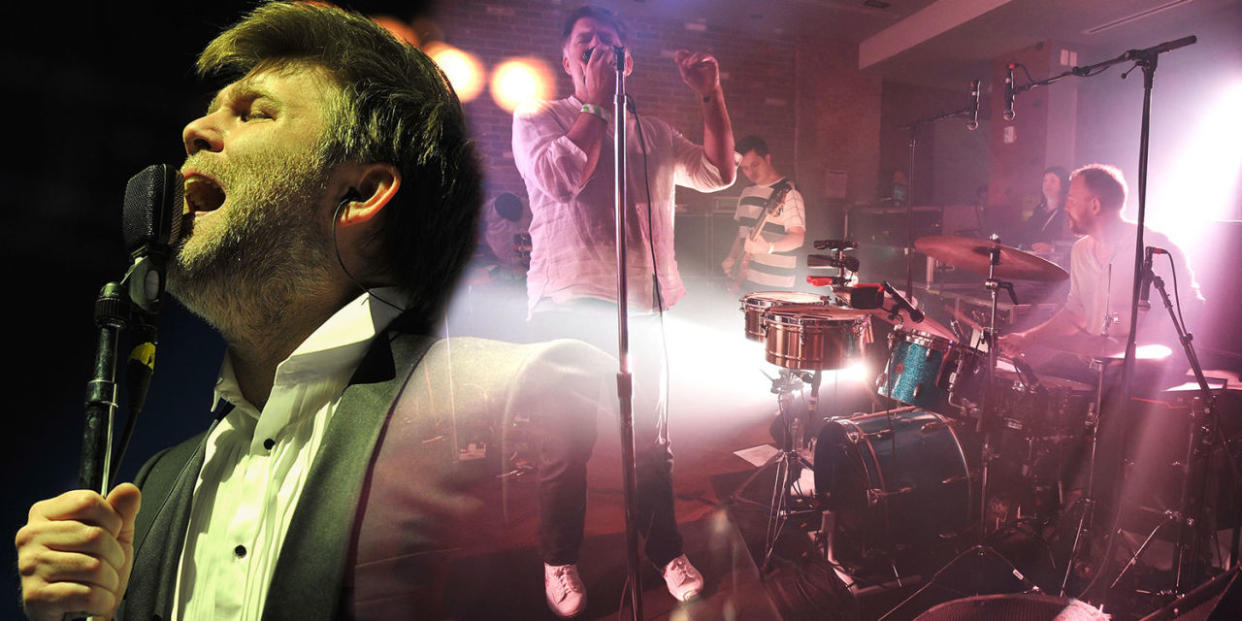LCD Soundsystem Is Back. But This Is Not the Same LCD Soundsystem.

For half a decade, the phrase "I was at LCD Soundsystem's final show" was a badge of honor-one that made someone both obscenely smug and begrudgingly enviable among certain music fans. As the years went on-and as LCD Soundsystem's retirement became more and more real-the balloons and the tears of the farewell show became the stuff of 21st century music mythology. It was immortalized in the documentary Shut Up and Play the Hits, in which James Murphy's decision to end his band at its cultural peak seemed like a hyper-romantic curtain call-the perfect bow for someone as self-aware as this particular frontman. But it didn't stick. Whether for money or for the art or out of boredom, LCD Soundsystem announced its return last year. "This is just the bus full of substitute teachers back from their coffee break with new music and the same weird gear," Murphy wrote at the time. And, like that, thousands of fans suddenly lost their proof of musical superiority-an anecdote that almost made their crate-digging taste as pristine as Murphy's himself. That, if anything, was the greatest joke of all that Murphy could have played.
The band returned for its first show in five years on the very modest and not-at-all-symbolic day of Easter Sunday 2016. What followed was a headlining tour at just about every music festival and massive amphitheater in the world. But still: no album. After the tour, LCD Soundsystem went home, counted their money, and slowly trickled out a series of new songs at warm up shows through 2017.
Now, 2,344 days after their farewell show, LCD Soundsystem has returned with American Dream-the band's first album since 2010's This Is Happening.
And the truth is: This isn't the same LCD Soundsystem that left the stage on April 2, 2011.
This is the LCD Soundsystem after the break. This is the New LCD Soundsystem that will always be compared to the 2010 LCD Soundsystem. This is LCD Soundsystem creating nostalgia for LCD Soundsystem, which itself was nostalgic for Talking Heads, Brian Eno, and '70s and '80s art rock. This LCD Soundsystem is older, which for a band preoccupied by aging-and specifically getting too old for what's considered cool-is very important. And on American Dream, Murphy's had six years of objective observation, where he's behind the scenes, pursuing other projects, and not fronting his own band. It's a somewhat similar position from where he started the band in the first place.
While stylistically it retains the lush, bongo-obsessed production, funky bass lines, and chorus of hyper-specific influences, LCD Soundsystem avoids the emotional climaxes of "All My Friends" and the drops of "You Wanted a Hit." This LCD Soundsystem is more reserved-adult, one might say-with the maturity to focus on the nuances of construction rather than the thrills of the ride. Take "How Do You Sleep?" for example, which eases into its beat nearly five minutes into the song; if there is a chorus, it doesn't arrive until a minute later. And its closing track, "Black Screen," at nearly 12 minutes, is a tragic, mostly ambient soundscape. Contrast that with "Call the Police," on which Murphy leans more into his rock sensibilities with a driven post-punk ballad. And "Emotional Haircut," is more '70s Devo than the later era that's more recognizable in LCD Soundsystem's music. For some, that might not be as fun; it might not be the best stuff for LCD Soundsystem-themed dance parties. But for others-people like Murphy-it might be a total blast, something to nerd-out with through top-of-the-line studio headphones.
What's certainly rewarding is Murphy's writing on American Dream, which has some of his most-detailed lyrics of any LCD Soundsystem album. Typically, Murphy's lyrics can range from blunt observations, vague personal monologues, and occasionally nonsensical genius. And sometimes he hits all three at once in songs like "Someone Great" and "All My Friends" and "Dance Yrself Clean." But his ideas on American Dream are more concrete and approachable, if loftier. On "Tonite," Murphy brings his sharpest analysis to LCD Soundsystem's perennial obsession with aging. "And all the hits are saying the same thing / There's only tonight" he sings. "And life is finite / But shit, it feels like forever." Then in a breathless closing verse, Murphy has perhaps his greatest piece of advice for a generation of hipsters who came of age in his image:
"And terrible people know better than you / They're used and abused of the once so dear listener / So you will be badgered and taunted and told that / You're missing a party that you'll never get over / You hate the idea that you're wasting your youth / That you stood in the background oh until you got older / But that's all lies / That's all lies"
Rather than point out things he thinks are cool or uncool, the sage himself is finally giving some direct guidance. On the title track, Murphy sings, "In the morning everything's clearer / When the sunlight exposes your age." And maybe for LCD Soundsystem, American Dream represents the morning after the party. Now, after a few years of rest, they're looking for clarity, for something a little bit more reserved, and an escape from what they did the night before-only in this case, the party shut down six years ago.
You Might Also Like

